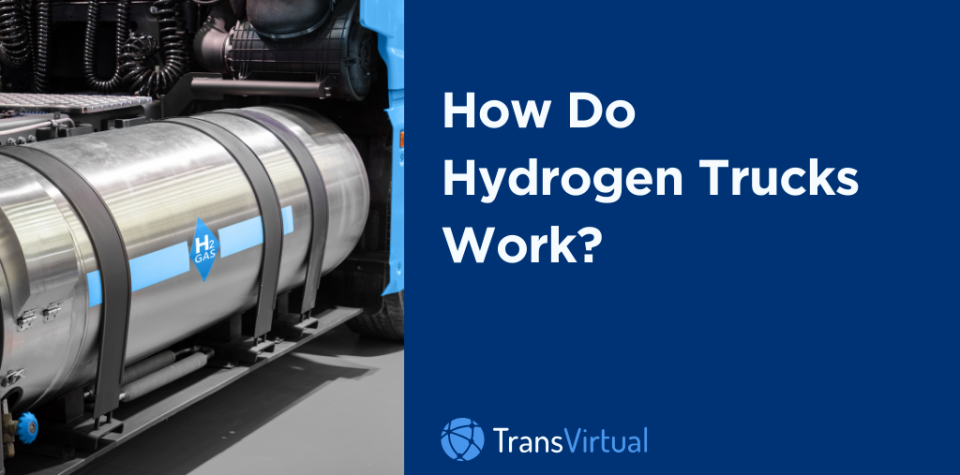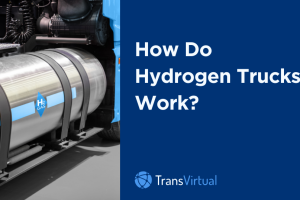Table of Contents
Driven by environmental concerns and technological improvements, hydrogen trucks have recently become a big part of the green revolution in the logistics industry. Right now, businesses and consumers are looking for alternative solutions that are sustainable and efficient – and in Australia, they’re being slowly adopted by various companies.
Should your logistics and transportation business consider swapping to hydrogen trucks? Lets find out.
What is a Hydrogen Fuel Truck?
Hydrogen fuel cell trucks are heavy duty work vehicles that employ an electric propulsion system using hydrogen fuel cells as their primary energy source, unlike traditional combustion engines.
Hydrogen trucks function on the road like any other truck, but the result of that function is much more attractive in the modern eco-conscious era. A good example is the Xcient Fuel Cell Trucks from Hyundai.
These advanced trucks emit nothing but water vapor as a byproduct of the fuel they use, which reduces the overall carbon footprint of a business’s logistics operations. Moreover, hydrogen-powered trucks have less driving range risks and improved refueling time, reducing worries associated with other electric vehicles.
Fuel cells can be refueled at hydrogen fueling stations. While they’re relatively low in number compared to countries like Japan or South Korea, hydrogen fueling stations are starting to open in regions like Victoria and Queensland.
Hydrogen Trucks vs. Battery Electric Vehicles
Electric vehicles (or EV trucks) and hydrogen fuel cell trucks have one, or two, obvious differences. EV trucks use electric motors while hydrogen trucks operate using hydrogen internal combustion engines (ICE).
Today, EV trucks are commonly used for short-haul transportation or deliveries, but they’re not suitable for long-haul scenarios due to limitations like range and charging time. Hydrogen trucks, however, offer promise for long distances with longer ranges, faster refueling, and potential for better payload capacity.
However, they face infrastructure challenges, particularly in countries where fuel cell technology is still developing.
How Does Hydrogen Fuel Technology Work?
In a hydrogen-powered truck, high-pressure hydrogen gas is fed to the fuel cell stack. At this location, hydrogen molecules encounter a catalyst, usually platinum, and are separated into protons and electrons that create an electric current that powers the truck’s electric motor and is stored in a battery.
The hydrogen fuel itself is held in hydrogen tanks under high pressure which ensure a continuous supply reaches the fuel cell. Refueling a hydrogen truck is surprisingly similar to refueling a conventional diesel truck – the hydrogen pumps connect to the truck’s storage tanks and fill them in a comparable time to filling a diesel tank, unlike the many hours it takes to charge an electric vehicle battery.
Benefits of Hydrogen Trucking
As the logistics industry grapples with more and more environmental regulations each year, the more appealing hydrogen trucks become. Many businesses see hydrogen trucks as a great opportunity for a few reasons:
Eco-Friendly
The most far-reaching feature of hydrogen trucks is that they generate zero carbon emissions and fossil fuels. While diesel trucks discharge huge clouds of carbon dioxide, nitrogen oxides, and particulate matter, hydrogen trucks emit only water vapor. This means a major reduction in greenhouse gases and helps fight climate change, consequently improving air quality in urban areas.
Efficiency Benefits
Hydrogen trucks are approximately twice as efficient as battery-electric trucks and can run over 500 miles before refueling. This comes in handy for transcontinental operations because your drivers won’t need to stop as often. Plus, since they can be refueled within minutes, you gain faster turnaround with more time on-the-road, thereby boosting productivity.
Challenges and Future Prospects
Although hydrogen trucks are a promising technology, some issues have to be properly addressed for their potential to be fully realized.
High Production and Infrastructure Costs: Producing hydrogen fuel cells is currently a very expensive process, primarily due to the need for platinum. Additionally, building the infrastructure required by refuel stations is severely capital intensive. This makes initial costs much higher than those of conventional diesel and electric which benefit from existing infrastructure.
Limited Refueling Stations: The operational radius of hydrogen trucks in Australia is fairly small due to the lack of abundant refueling infrastructure. However, investment in hydrogen infrastructure for long-haul trucking is taking place quickly around the world – and Australia won’t be far behind.
Technological Advancements: Production costs for high-tech equipment continue to shrink as innovators improve technology year after year. This means creating hydrogen fuel cells will become more efficient, and research on alternative catalysts and improved methods for storing hydrogen can make hydrogen trucks more viable. Plus, government incentives and clean energy policies can further catalyze the adoption of hydrogen trucks for transportation and logistics companies worldwide.
In 2024, hydrogen trucks are but a small part of how the logistics industry is shifting toward a sustainable future. These vehicles bring strong environmental, operational, and long-term cost advantages.
Businesses in Australia and beyond now need to consider the ways in which a revolution in hydrogen trucking can totally change their logistics processes and assist in delivering a cleaner, greener world.
Want to start exploring greener solutions? We can help. TransVirtual’s trasport management system has route optimization and fleet management features to help you reduce your carbon footprint today.



